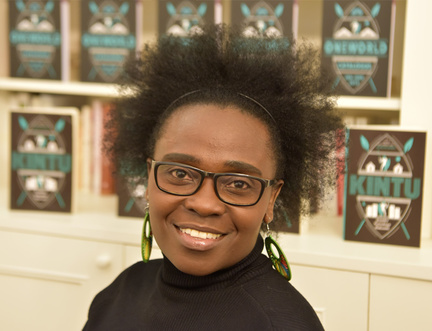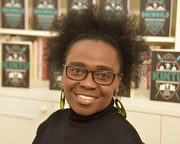More articles Wednesday 19 August 2020 3:45pm
Jennifer Nansubuga Makumbi Shines a Light on Ugandan Feminism

Today, the recipient of the 2018 Windham-Campbell Prize for Fiction, Jennifer Nansubuga Makumbi joined editor and culture columnist of The Economist, Fiammetta Rocco at the Edinburgh International Book Festival online, to discuss her latest ground-breaking novel The First Woman, and her place in a new canon of formidable female writers from Africa, who Margaret Busby OBE christens ‘The New Daughters of Africa’.
To highlight the historical struggle for African female writers, Makumbi revealed that she first started writing The First Woman in 1998, citing as her inspiration the words of a British headmaster of an international school she was teaching at in Uganda: “He was surprised that Ugandan’s were waking up very early in the morning and going to work. I remember him saying to me – “Jennifer I’m surprised – people in England apparently have been told that Africans don’t work, that you just sit here waiting for aid… you need to write – you need to tell the world that Africans work hard.”… I did know I can’t write about Africa, let alone the whole of Uganda, even the little space I occupy. But nonetheless I started writing, and this is the kind of story that came out.”
However, she added that the book suffered many rejections – in 2003, after completing an MA in Creative Writing at Manchester Metropolitan University, then again in 2005, and again in 2008: “At that point I thought, forget it.” But she continued to write, determined to help write and narrate the story - and history - of feminism in Uganda. “Whenever you talk about feminism in Uganda they say, oh that is not our culture, it came from the West - it’s come to destroy our culture. And we were not making any headway… So I decided to go back into oral traditions and find stories where our grandmothers and our female ancestors must have recorded their experiences… I went back and unearthed ideas my ancestors had come up with. And this was specifically to say to Ugandans that there was a tradition of feminist thought here, but it hadn’t been written… I wanted to say to the West that Africans obviously had feminist thought, but it was fragmented…”
Her ambition, however, is greater than telling the story of feminism in Uganda for Ugandans, or for Africans – Makumbi wants to inspire people in other parts of the world: places where women are still repressed, and feminism is still viewed as something reserved for Western women – that it is something all women should fight for. Whether feminist histories have been written or not, women have had to fight for their place within patriarchies, since the dawn of civilisation. “When Western Feminism arrived, it arrived with such muscle that it overran, and over-wrote all the ideas that were developing. This is me pulling them out, and picking them for Ugandan readers, for African readers, but for the West as well… because I believe that right now we need all the knowledges from all over the world, and I believe that if I can put Ugandan feminist thought out there, there will be other feminist thoughts coming from everywhere else. And I think this will make feminism stronger.”
Makumbi also asserted that she wanted to dismantle the continued Western perception of Africans and Africa that’s been perpetuated by charity organisations, despite good intentions. “I wanted to say that, yes war happens, and yes drought and famine happens, but that’s not the picture of African childhood, that is the rare aspect – naturally, we don’t look like that… in all their wonderful intentions, the charity organisations do create this terrible, terrible outlook on Africa that we Africans tend to look at and think - what is going on here?”
When asked, ‘What has brought forth this extraordinary generation of writers, this golden age of writing from Africa, especially by women?’, Makumi humbly replied, “Whenever we sit together as African writers, especially women, we wonder what is going on!” However she goes on to praise the ‘first wave’ of African women writers “that some of us call our ‘mothers’, others call our ‘grandmothers’: Mariama Bâ, Buchi Emecheta, Flora Nwapa, Ama Ata Aidoo, who wrote against everything, because they were ignored by fellow African male writers in the beginning… but they went out and tried their hardest… but we tend to look at them as the women who’ve got the machetes and went to the forest and cut out a trail…”.
She went on to applaud the ‘second wave’ of women, who wrote in the 1980s, including Tsitsi Dangarembga, commenting that “It all comes from a culture where women had been pushed back, we had all been brought up on male texts… and of course as a girl when you read these books, you are wondering what of earth is going on? Where are the girls? And you are dreaming, if I ever get the chance I would write the kind of girl that I know, and I would make the world of women the centre of the world. And I imagine that all of us, all over Africa, we’re thinking of this, we’re dreaming about it, and we’re thinking we’re going to do a good job of it, and here we are! But I think it’s because we came from a very repressed background and we saw our fore-mothers, who first wrote how they were treated, and we decided - we’re going to go all the way.”
On a final, and pertinent, note she talked about the power of books and of reading, stating “[Reading] was the only way I was able to travel. I could not get on a plane and go to the US, and the books that I was reading from there, or come to Britain, and the books that I was reading from here… I was able to go into worlds, and discover people, and discover cultures, so I always write that in mine – that readers come to my book to travel into my world.”
--
This event was supported by the British Council. You can rewatch it in full on our website: https://www.edbookfest.co.uk/the-festival/whats-on/jennifer-nansubuga-makumbi-uganda-s-first-woman-of-fiction/player


 Major new partnership with Celtic Connections
Major new partnership with Celtic Connections 

